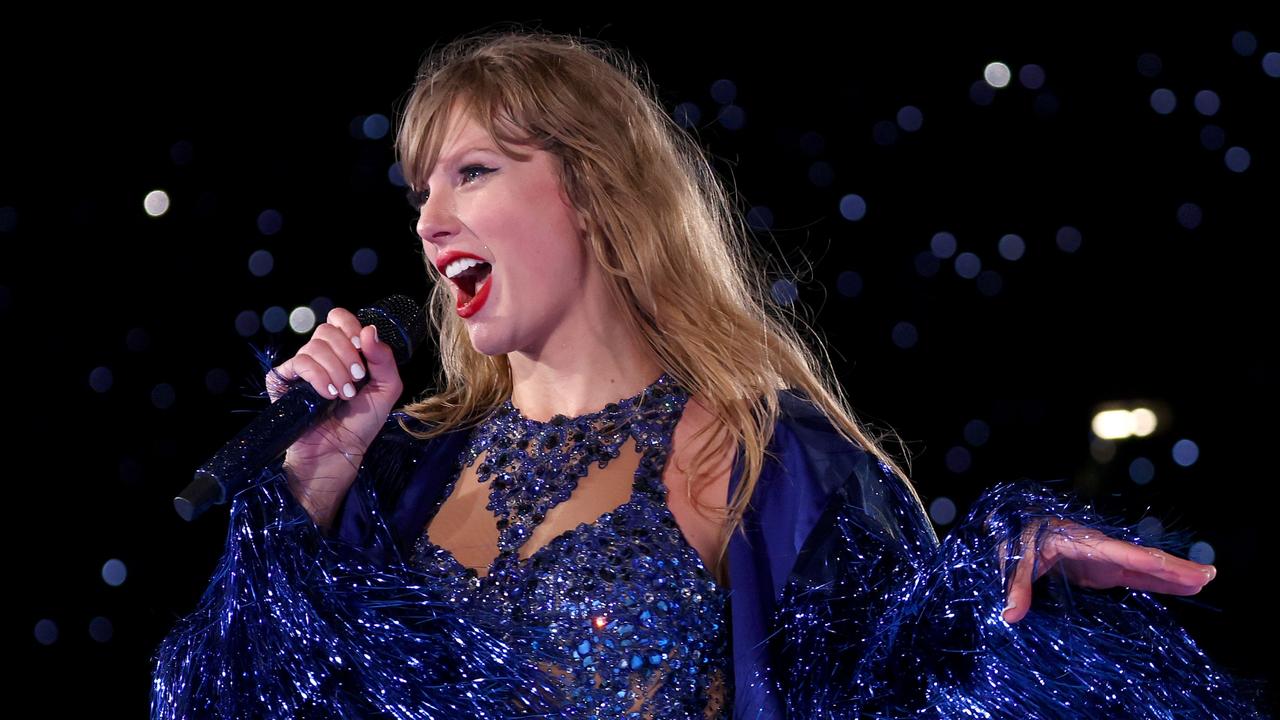By the time Taylor Swift had finished the Melbourne stint of her Eras Tour, she had already worn about 25 different outfits.
The three-hour event generally features 16 costumes for every performance, with Swift’s outfit changes representing the different eras of her discography. All in all, she has more than 40 costumes, designed and created by a range of top designers in the fashion industry.
Alberta Feretti, one of these famed designers, told Harper’s Bazaar the tour represents “a very important moment in Taylor’s career”.
“I’m honoured that she asked me to design dresses for this special occasion,” she said. “I have always been fascinated by women who constantly question and challenge themselves and Taylor, with her work, has demonstrated to be a multifaceted artist, able to constantly transform and evolve.”
But taking these designs around the world isn’t as simple as packing them into a box. There’s a big team responsible for taking care of them, from controlling where they’re stored to repairing them when things go wrong.
Nigel Shaw, a costume designer who regularly works on travelling musicals and concert tours, said there would be a dedicated person or persons regularly attending to the upkeep of Swift’s gear every night – and while some costumes may have spares, there likely aren’t duplicates of every outfit.
“If each dress was, say, $15,000, then they’re not going to make four versions of it,” he said. “They would just repair them as they go, or she would stay in a [different] costume if something went wrong.”
Swift has multiple different costumes for each of her “eras”, with the exception of her Reputation era – which places her in a single black Roberto Cavalli catsuit.
Costume teams on a project such as the Eras Tour work hard every performance to repair and touch up the outfits: whether it be the lead designer working on Taylor’s costume or the whole team washing and stitching up what other performers are wearing.
“You literally travel with a massive kit in the hope that you never have to use it,” said Mr Shaw, who’s currently working on costumes for Six: The Musical.
“Even the shoe paints for Taylor’s silver glitter boots: they have to be constantly re-glittered, so they always look fresh and new.”
Because of this, outfits are generally the first things in and out of a new location when the team moves from place to place. To handle climate conditions such as the unpredictable Australian heat, they’re likely placed in a closed airconditioned area such as a trailer.
“When you travel with [costumes], sometimes they put them in calico bags that absorb sweat and heat and moisture,” Mr Shaw said.
He added that most of the equipment a team might use is shipped over for a tour, whether that be fans for airconditioning or even the trailer that stores the costumes itself.
The costumes that Swift wears range from simplistic dresses to complicated ensembles – and according to Mr Shaw, more work goes into making them than people know.
This includes making the outfits versatile and adjustable, in case the wearer gains or loses any weight during the time spent performing.
“If you actually had to see it, and do it, and make it look like it’s effortless and a simple look? It’s way more complicated than people ever think,” he said, using beaded costumes as an example. “Do you realise that took six weeks, one person, beading that? And with each row a bead is individually knotted on – you don’t go to a shop and buy the beaded fabric. It’s been done individually.
“So [a performer’s] in it for three minutes and you go ‘wow, that looks great!’. But people don’t realise that that’s been someone’s job, for the whole time that the show has been put together.”
Even after a tour is over, the outfits that were worn during the performance hold a great deal of value, and are often cared for long after their use.
Margot Anderson is the Head of Curatorial for the Australian Performing Arts Collection at Arts Centre Melbourne, and worked with musician Kylie Minogue on preserving her outfits after her tours.
Storing outfits after a tour can require control of the room’s heat, humidity, light levels and even how they’re displayed.
“Looking at Taylor Swift costumes, they’re so embellished and so heavily beaded,” she said. “I would imagine you’d need to keep costumes like that flat. You couldn’t hang them, because the weight of them actually really puts a lot of strain on areas of the collection.”
When a costume has been through a tour, the wear and tear can sometimes tell a story. When Minogue gave her “well looked-after” outfits to Ms Anderson, she showed an interest in showing the parts of the costumes that gained some battle scars.
“She did point out these little aspects of performance that people might not be aware of,” she said, whether that be hidden microphone packs or makeup residue on the outfits – along with alterations Minogue made herself.
For ‘Swifties’, the story Swift is telling through her costume design will stick with them long after the crowd-roaring shows are over.
“Looking at Taylor Swift and this lovely idea that she’s had of the eras, and looking back over a catalogue in a visual way; I think that’s a really clever and a really kind of human way of helping people connect with a body of work,” Ms Anderson said.
“Costumes add a whole other element to performance, and I particularly love watching people react to them and respond to them and where they go: the memories that they trigger, the feelings that people get … they’re just so glorious. They really do a prompt a lovely, joyous response – which is a real privilege, to be able to help be a part of that and preserve that.”
